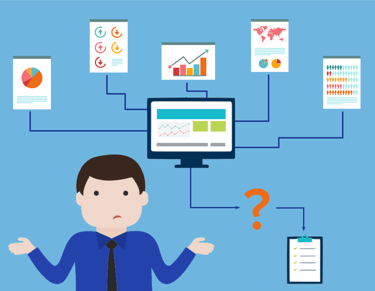 How much data on your guest satisfaction, staff performance, and online reputation did you collect last quarter? How did you collect it, and where did you collect it from? And, most importantly, what did you do with it?
How much data on your guest satisfaction, staff performance, and online reputation did you collect last quarter? How did you collect it, and where did you collect it from? And, most importantly, what did you do with it?
If your answer is a shrug of your shoulders, you’re getting left behind. Without solid data, your operational and marketing decisions are likely to be based on hunches and whims – not usually a sound business plan. Luckily, information and communication technology has evolved to the point where we have data collected from thousands, or even millions of individual actions at our fingertips.
TripAdvisor says that it has around 350 million reviews – and it frequently does studies and publishes the results for all to see. In 2012, Google received 1.2 trillion searches, and it uses data from these searches to produce publicly available reports and studies. Your hotel also probably gathers its own unique data from guests satisfaction surveys and your own listings on review sites and online travel agencies (OTAs).
What information is available to you
Because big data has become so much easier to access, many business people are tempted to believe that it is a new phenomenon and something to be intimidated by. The truth is that big data has always existed, but it has remained in the hands of the fortunate few who had the resources to collect it. Now all hoteliers have useful big data available to them.
The easiest place to find data about your own operations is in direct guest feedback and online reviews. A careful look at your TripAdvisor score and reviews and an analysis of your direct guest feedback can give you insights that can help you greatly with your marketing efforts and guide your operational decisions.
The trick is not so much finding the data as figuring out how to use it – how to turn your big data into smart data that will provide you with actionable intelligence that you can use to inform your business decisions.
Finding smart data in big data
When interpreting your data, the most important thing to remember is to filter. You are probably going to have far too much data to be able to read and interpret all of it thoroughly. Use your big data to discover insights about correlation, and use smart data to help you understand why those correlations exist.
Researchers at Cornell University recently did a study on hotel reviews in which they used sophisticated text mining software to glean insights from both big data and individual reviews. Their key findings were very interesting for hoteliers who would like to analyse their own data:
Negative experiences are more powerful than positive ones
The Cornell team discovered that negative sentiment tended to have a stronger impact on a guest’s overall rating of the hotel than did positive sentiment, leading them to recommend that hoteliers focus on maintaining a generally good experience for customers, rather than one that is outstanding in some ways and falls short of expectations in others. When analysing your data, remember that just because a score is low, it doesn’t mean that a guest’s entire experience was negative, but rather that there was a particularly negative aspect of their experience that overshadowed the good.
Different tiers of hotels should focus on different aspects of the guest experience.
In the reviews that the Cornell team analysed, guests at higher tier hotels most often spoke about their experience, and middle and lower tier hotel guests focussed on amenities and location.
Happy guests and unhappy guests talk about the same things
While guests at different tiers of hotels generally tend to care about different things, unhappy guests tend to focus on the same things, regardless of the type of hotel. Generally, unhappy guests mention issues of “value” and “transactions”, while happy guests focus on things like “experience” and “location”.
Unhappy guests write more
The Cornell team also found that long reviews that spoke in-depth about just a few topics almost always accompanied low ratings, while shorter reviews that mentioned many aspects of a person’s stay were associated with higher ratings.

What does this mean for analysing your own data?
It means that not all insights are created equal, and if you want to make your big data smart data, you need to focus on what matters to your hotel.
If you have a high tier hotel, for example, reviews rating your location and guest experience highly should be your norm – your big data should reflect high scores in these categories.
The individual reviews that praise your location and guest experience will be the ones that will help you to discover what your hotel’s most appealing elements are, and what you should be focussing on in your social media posts, on your website and in other marketing material. The reviews that focus on value and transactions are the ones to look at if you want to know where your hotel needs to up its game.
If you run a hotel catering to those on a tighter budget, be aware that value for money is what matters most to your guests. Your big data should show a high score in this area, and individual reviews that rate your establishment highly in this category will be those that show you what satisfied guests are thinking.
All hoteliers should be on the lookout for lengthy reviews. These will probably be the ones that tell you where your hotel has fallen short of guest expectations, and therefore the ones that give you the insights you need to improve your offerings.
The key to turning big data into smart data is understanding why your big data reflects the results that it does. Using your knowledge of your business, your clientele and your target market, you can filter and interpret your big data and turn it into smart data.
Making it easy
While there are tricks to analysing your big data and using online reviews to create smart data on your own, there is software that helps you to capture and analyse the big data available to you from a multitude of sources such as various online review sites and your own direct guest feedback.
Chat to a GuestRevu consultant or request a GuestRevu demo to see how this software can help you turn big data into smart data the easy way.




